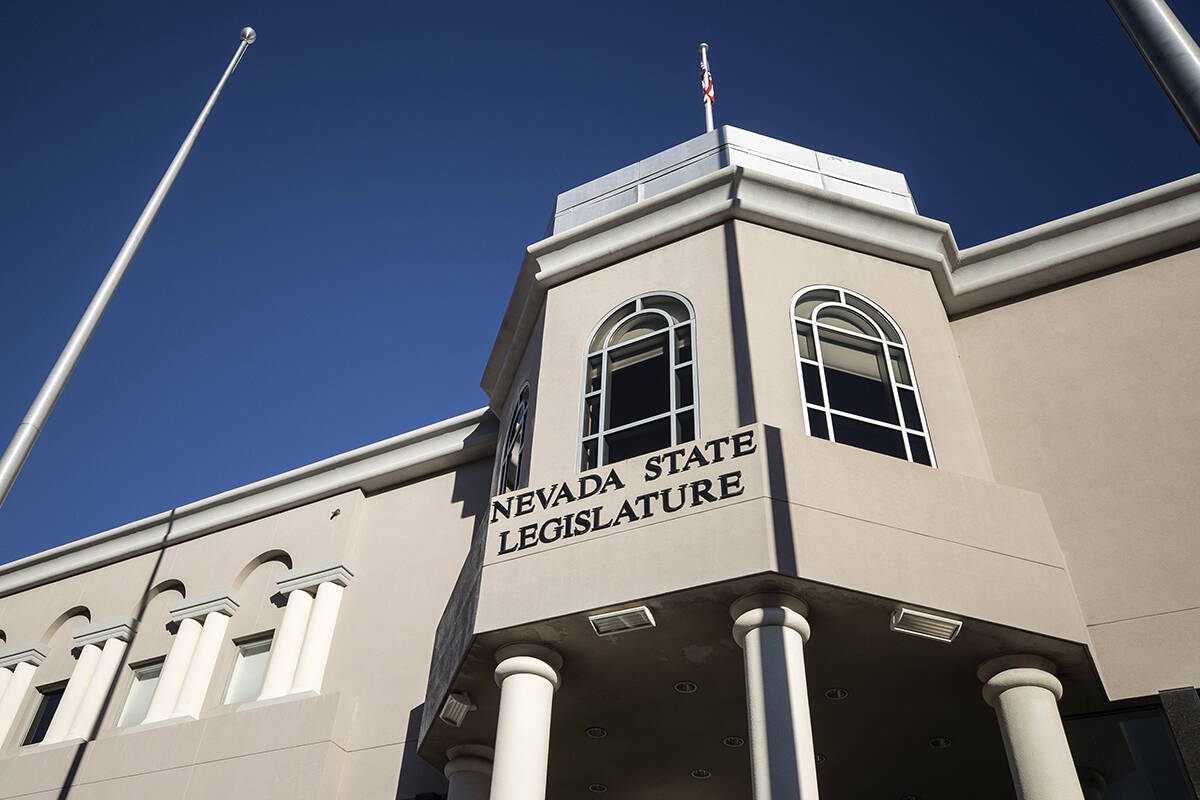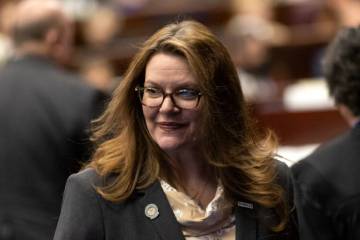From water to bees, Nevada lawmakers trying to save nature
CARSON CITY — In the shadow of the snowcapped Sierra Nevada, conservation activists and Democratic legislative leaders gathered in front of the Nevada Legislature to pledge to protect the environment.
“I’m going to promise you this,” Assembly Speaker Steve Yeager, D-Las Vegas, said to a small crowd. “We will continue to work with our partners in the federal and local government, tribal nations, business, and environmental community to make Nevada a sustainable, just, equitable and welcoming place that can thrive.”
Yeager’s words came days after President Joe Biden designated more than 506,000 acres of land in Southern Nevada as the country’s fourth national monument. Avi Kwa Ame, an area considered sacred by nearby Native American tribes, is now protected from future development and is one of the country’s largest contiguous areas of protected wildlife habitat.
The move was applauded by environmental groups and Democratic lawmakers Monday morning, but one voice was notably absent from the celebration — Gov. Joe Lombardo.
The Republican governor, who slammed the Democratic president for not including state officials in the conversation, calling it “a historic mistake,” gave his own directive on Monday. Just hours after the news conference, Lombardo announced his seventh executive order: It outlined what he called a “balanced approach” between renewable power and fossil fuels, such as natural gas. It’s a sharp departure from the policy of his predecessor, Democratic Gov. Steve Sisolak, whose administration called for leaving natural gas behind.
Lawmakers in Nevada are wrestling with how to combat the increasingly severe effects of climate change. From attempting to combat Nevada’s drought to making steps to address environmental injustices, lawmakers have introduced several bills concerned with the environment, climate and the future of energy.
Water
As the nation’s driest state, access to water is one of the most critical issues facing Nevada, especially the southern part of the state.
Assembly Bill 220, sponsored by the Joint Interim Standing Committee on Natural Resources, is an omnibus bill that would give the Southern Nevada Water Authority power to limit residential water use and would gradually convert homes with septic systems into the municipal sewer systems to recycle more water.
Senate Bill 176, sponsored by Sen. Pete Goicoechea, R-Eureka, would allow the state to buy back groundwater rights in areas where water has been over-appropriated. The bill is meant to give people in those areas a softer landing, Goicoechea said.
“Under Nevada’s water law, if you’re a junior right, you go away,” he said. “You spent 40 years of your life trying to build this farm, ranch, whatever you’re building, and just because of where you are in the water priority (hierarchy), you go away.”
But the alternative to not taking back some of those over-appropriated water rights could mean groundwater basins “pumped dry,” said Nature Conservancy Director of External Affairs Jaina Moan. “It would give us a tool to address the situation that we have here in Nevada,” she said.
The Nature Conservancy is a global nonprofit, nongovernmental organization dedicated to conserving land and water.
Another bill being considered by lawmakers is Assembly Bill 387, which would require and the state engineer to “consider the best available science” when making decisions about groundwater and make clarifications to statute. Assemblyman Howard Watts III, D-Las Vegas, the primary sponsor of the bill, said it is meant to “clarify and make sure that the state has the ability to make decisions that protect our water resources long term and don’t lead to a decline.”
Emissions
Watts has sponsored several bills related to environment, including two related to zero-emission vehicles.
Assembly Bill 184 would create an incentive program for companies to transition to zero emission medium and heavy-duty vehicles.
The proposed legislation, which is supported by the Western Resource Advocates and Nevada Conservation League, could be “huge,” said Nevada Conservation League Deputy Director Christi Cabrera.
“Cleaning up that sector will be huge, not only for reducing climate emissions, but also reducing air pollution,” Cabrera said.
Watts is also sponsoring Assembly Bill 262, which requires, when practical, government agencies to give preference to vehicles that minimize emissions and encourages the use of more environmentally friendly fuels, like biodiesel and ethanol fuel blends.
Electric vehicles could end up costing the state less, Watts said.
“What we see is sometimes electric vehicles, they have a higher upfront cost, but if you factor everything in, they actually are a benefit and a money saver over the long run,” Watts said.
Lawmakers are also considering a bill to protect workers from extreme heat. Senate Bill 427 would require employers to provide certain heat protection measures, like water, shade and required breaks.
The bill is being pushed by the Nevada Environmental Justice Coalition.
‘Environmental justice’
Lawmakers are also considered measures related to environmental justice, which concentrates on communities at the highest risk for hazards, said Assemblywoman Sarah Peters, D-Reno.
“We want to look at how state decision making, how regulation development may impact those communities. And the point is to attempt to mitigate those impacts early on in the process,” she said.
Peters is sponsoring Assembly Bill 312, which would create the Commission on Environmental Justice. The commission would be directed to review regulations at the state for their potential to impact environmental justice communities, Peters said.
The bill is supported by the Nevada Environmental Justice Coalition and the Nature Conservancy.
“It’s a good step forward for the state really starting to take a look at those decision-making processes that could contribute to environmental injustice,” Moan said.
Assembly Bill 71 would require the state to conduct an environmental justice study. It would aim to identify the communities affected by environmental injustices and would require the state to come up with a plan on how to mitigate them.
Peters is also sponsoring Assembly Joint Resolution 3, known as “the Green Amendment.”
“The point of the green amendment is to constitutionally protect natural resources for the citizens of the state of Nevada,” Peters said. “In the state of Nevada, we don’t have anywhere that charges the protection of natural resources despite having an Office of Environmental Protection.”
If passed this year and again in 2025, and approved by voters in 2026, it would change language in the state constitution to declare individuals’ rights to water, clean air and a healthy environment.
Wildlife
And lawmakers aren’t just considering environmental impacts on humans. A handful of bills look to protect wildlife.
Assembly Bill 112, for example, would set aside money and apply for federal matching funds to build wildlife crossings.
The bill is supported by Western Resource Advocates, a regional nonprofit advocacy organization focused on fighting climate change.
“It’s important for Nevada to create a comprehensive plan to maintain, enhance and restore wildlife habitat. In order for us to do this, we have to ensure that the movement of wildlife, they can move safely between their seasonal habitats,” said Jermareon Williams, government affairs manager for the group.
And the crossings could save the state money, Cabrera said.
“In Nevada, we spend about $20 million dollars every year on accidents with wildlife and vehicles. It kills and harms people. It kills and harms wildlife and it’s a huge financial cost,” Cabrera said. “They’ve been proven to reduce collisions by up to 90 percent.”
Watts is also sponsoring Assembly Bill 102, which would prohibit wildlife killing contests. The bill, which was heard in the Assembly Natural Resources Committee, garnered strong testimony in support and in opposition.
Those in favor argue the contests are unethical, while those in opposition said the contests are part of an effort to control predator populations. Lawmakers are also considering Assembly Bill 221, which would close a loophole in current law that leaves insects and pollinators outside the jurisdiction of the Nevada Department of Wildlife.
“Giving (the Wildlife Department) this authority could actually help prevent species from becoming listed on the Endangered Species Act and prevent them from becoming endangered,” said Patrick Donnelly, Great Basin director for the Center on Biological Diversity.
Contact Taylor R. Avery at TAvery@reviewjournal.com. Follow @travery98 on Twitter.








